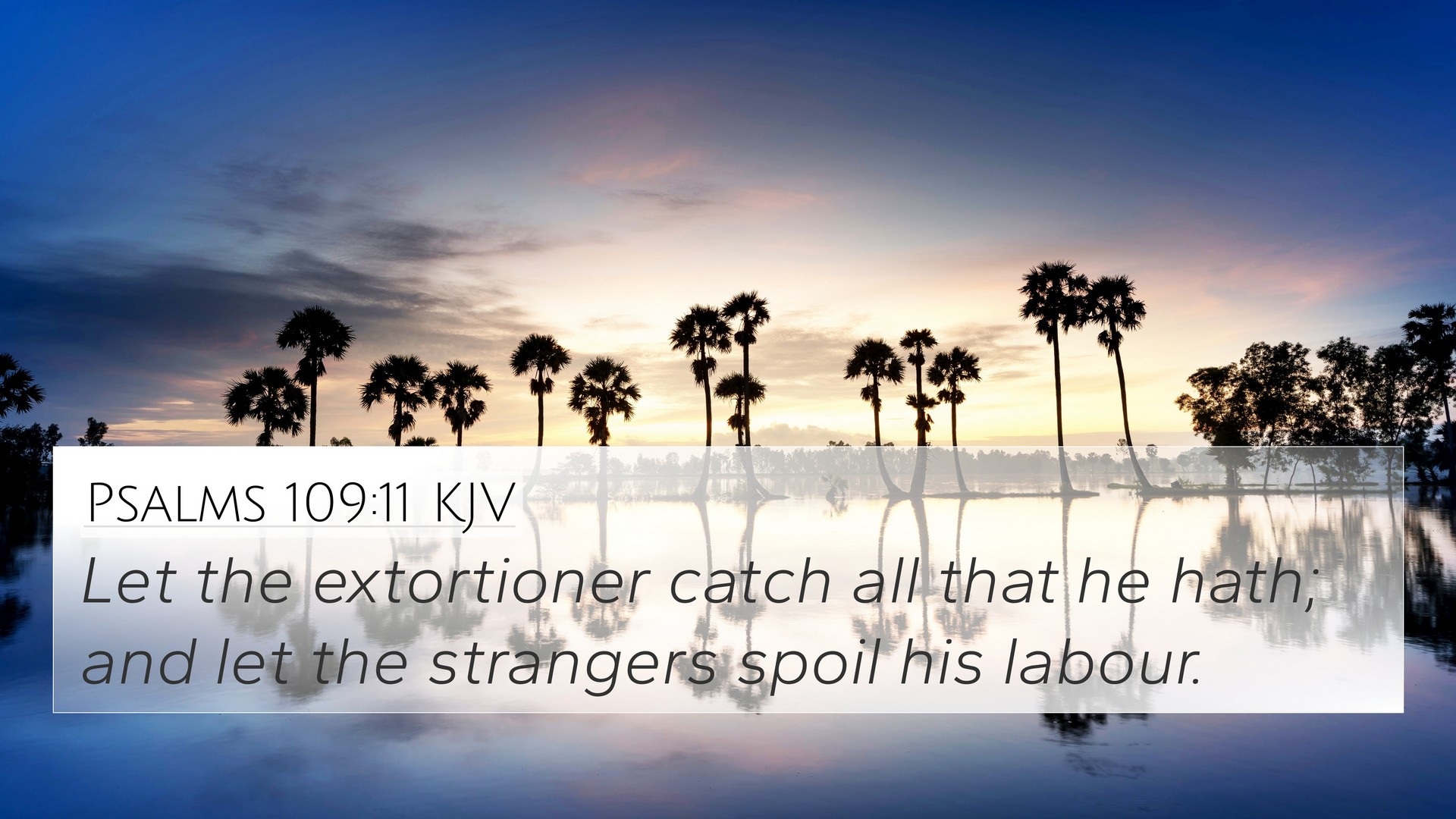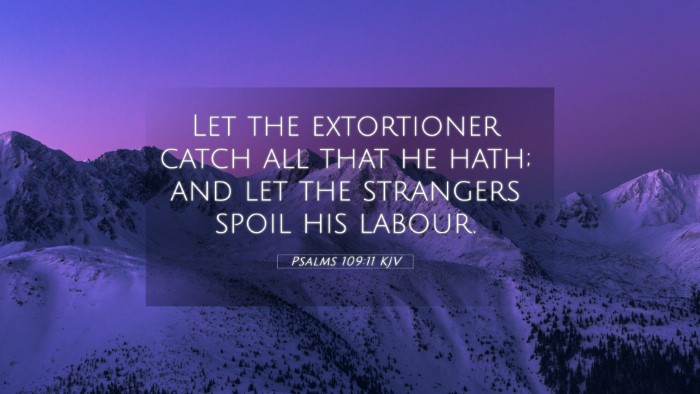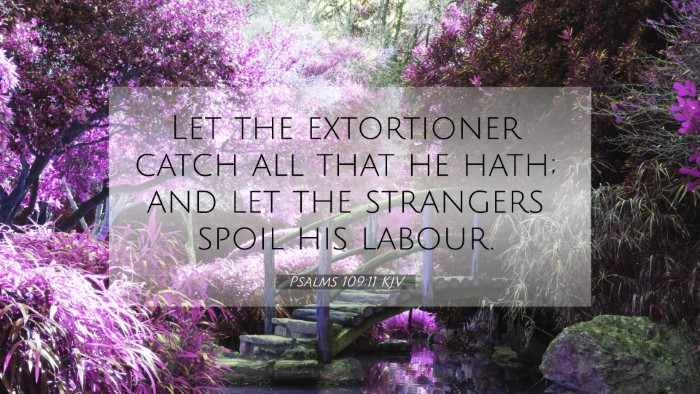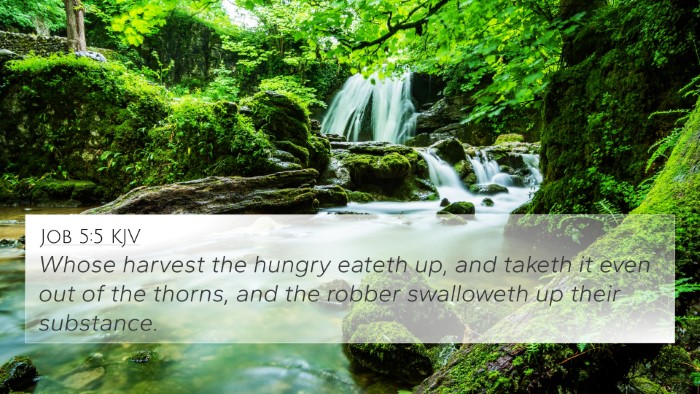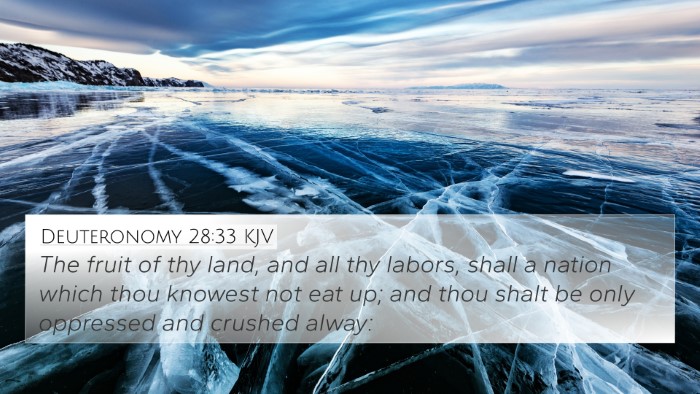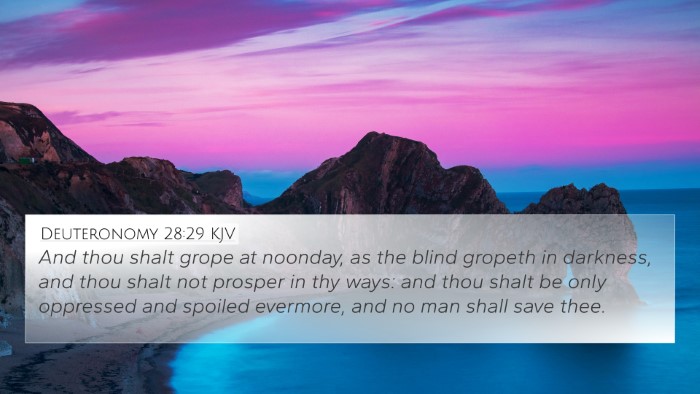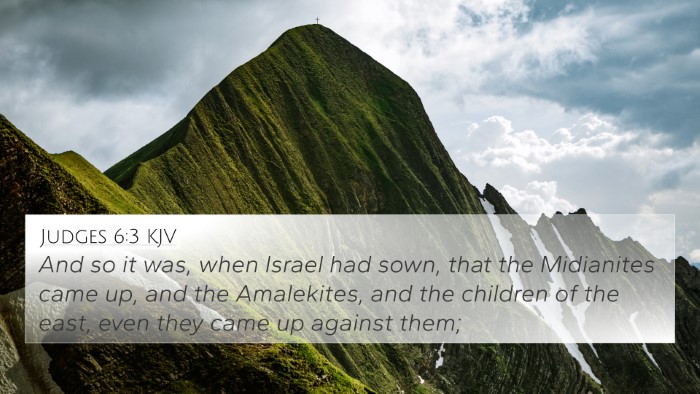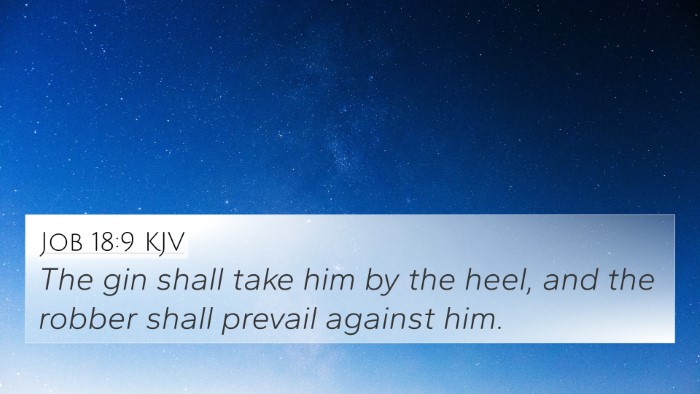Understanding Psalms 109:11
Psalms 109:11 states, "Let the creditor seize all that he has; let strangers plunder his gains." This verse is part of a larger plea for divine justice against an adversary, often viewed as a curse against the wicked, invoking intense imagery and a sense of retribution.
Interpretations and Insights
Matthew Henry's Commentary
Matthew Henry emphasizes the seriousness of the psalmist’s prayer. He interprets the request for the creditor to seize the wealth of the enemy as a direct appeal to God's justice, highlighting the notion that evil deeds must be accounted for. Henry suggests that the psalmist is imploring God to intervene and demonstrate His authority over justice, making it clear that those who harm others will not escape consequence.
Albert Barnes' Notes
Albert Barnes notes that the "creditor" in this context can symbolize not just financial debts but the moral and spiritual debts that one incurs through sinful actions. Barnes points out that the demand for strangers to plunder the gains reflects a desolation that accompanies divine judgment. It serves as a warning of the ultimate fate that befalls those who engage in wickedness, emphasizing the social and spiritual isolation they will face.
Adam Clarke’s Commentary
Adam Clarke discusses the metaphorical implications of the verse, offering that the "creditor" may also represent an inevitable accountability. Clarke suggests that the act of strangers plundering signifies that not only does God judge the wicked internally, but He also allows societal consequences to act against them. His take reinforces the theme of divine justice and the social ramifications of wrongful acts.
Bible Verse Cross-References
This verse can be cross-referenced with the following passages to deepen understanding and reveal thematic connections:
- Proverbs 22:7: "The rich rules over the poor, and the borrower is the slave of the lender." - This verse illustrates the dynamics of financial dependency and oppression.
- Lamentations 3:34-36: "To crush underfoot all prisoners of the earth, to deny a man justice in the presence of the Most High..." - This emphasizes God's concern for justice and righteousness.
- Job 31:16-22: Job’s defense against God emphasizes how ignoring the cry of the needy can lead to curses upon oneself.
- Psalm 37:21: "The wicked borrows but does not pay back, but the righteous is generous and gives." - Highlighting the contrasts in actions and consequences.
- Matthew 6:12: "And forgive us our debts, as we also have forgiven our debtors." - This introduces the concept of moral debts and the need for forgiving unmerited sinfulness.
- Luke 16:1-2: The parable of the shrewd manager outlines the scrutiny that awaits those who are unfaithful with wealth.
- Proverbs 28:8: "Whoever multiplies his wealth by taking interest and profit gathers it for him who is generous to the poor." - This verse connects with the consequence of unjust gains.
Thematic Bible Verse Connections
Understanding Psalms 109:11 requires an exploration of its themes related to justice, accountability, and the consequences of wickedness. These themes resonate throughout scripture, illustrating a consistent moral framework upheld by biblical texts.
Understanding Through Connections
The connections between these verses unveil not only individual teachings but an overarching narrative regarding God's governance of justice. The act of linking these scriptures provides clarity on the nature of divine retribution and emphasizes the consequences of human actions.
Tools for Bible Cross-Referencing
To engage deeply with the scripture, consider utilizing the following tools:
- Bible Concordance - A comprehensive reference tool that allows direct access to the themes and key terms used across the Bible.
- Bible Cross-Reference Guide - A structured guide that helps locate related verses easily.
- Cross-reference Bible Study - Methods designed for systematic exploration of associated scriptures.
- Bible reference resources - Resources that compile interrelated biblical texts to facilitate deeper understanding.
Connecting Psalms 109:11 In Context
When searching for cross-references related to Psalms 109:11, consider:
- Identifying Connections: This involves realizing how themes of justice and retribution maintain harmonious dialogue throughout the scripture.
- Comparative Bible Verse Analysis: Engaging in side-by-side study of passages from different parts of the Bible to see the consistency of God's character.
- Inter-Biblical Dialogue: Investigating how various books of the Bible speak about similar themes, aiding in the understanding of divine justice.
User Intent and Further Exploration
Many seek to understand how specific verses connect. For Psalms 109:11, here are some inquiries one might have:
- What verses are related to Psalms 109:11?
- Find cross-references for Psalms 109:11.
- How do Psalms 109:11 and Proverbs 22:7 connect?
- Similarities between Psalms 109:11 and Job 31:16-22.
- Bible verses that support the themes in Psalms 109:11.
Conclusion
By delving into Psalms 109:11 and its connections, we gain a fuller understanding of the scriptural landscape surrounding justice. This exploration allows for an appreciation of the complexities within biblical teachings and how they interweave to present a cohesive theological narrative. Engaging in cross-referencing not only enhances comprehension but also enriches one’s spiritual journey.
